July 7, 2017
Edited by David Sanders
Specimen Days
1771—Thomas Gray, English poet (Elegy), dies at 54
1855—Konstantin Batyushkov, Russian poet (b. 1787), dies.
1907—Helene Johnson, American Harlem Renaissance poet, born in Boston, Massachusetts (d. 1995), is born.
1915—Margaret Walker Alexander, poet/novelist (For My People), is born.
1929—Hasan Abidi, Pakistani journalist and poet (d. 2005), is born.
1945—Salomeja Neris, [S Bacinskaite-Buciene], Latvian poet, dies at 40.
1990—Cazuza, Brazilian poet, singer and composer (b. 1958), dies.
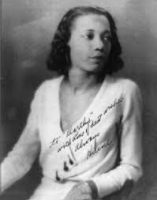
Invocation
Let me be buried in the rain
In a deep, dripping wood,
Under the warm wet breast of Earth
Where once a gnarled tree stood.
And paint a picture on my tomb
With dirt and piece of bough
Of a girl and a boy beneath a round pipe moon
Eating of love with an eager spoon
And vowing an eager vow.
And do not keep my plot mowed smooth
And clean as a spinster's bed,
But let the weed, the flower, the tree,
Riotous, rampant, wild, and free,
Grow high above my head.
—Helene Johnson
“Let me be buried in the rain / In a deep, dripping wood” – Helene Johnson
World Poetry
MP Ed Set to Launch Statue to Poet Ted
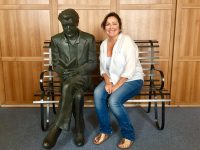
A statue in tribute to Ted Hughes is to be unveiled this evening in the town where the poet spent most of his early life. The artwork will be revealed by Doncaster North MP Ed Miliband at 5pm at Mexborough Business Centre, which is on the site of the town’s former grammar school which Hughes attended. The statue has been created by well-known sculptor Jane Robbins and is being launched as the Ted Hughes Festival gets underway. The artwork is one of the first parts of a new Ted Hughes trail, currently being developed around Mexborough to allow people to discover the poet’s work.
Sheikh Mohammed Urges Qatar to ‘return to the GCC’ in New Poem
Sheikh Mohammed bin Rashid Al Maktoum, UAE Vice-President and Prime Minister and Ruler of Dubai has urged Qatar to “return to the GCC fold” in a new poem published on his website and his Instagram account. The Arabic poem, titled Al Dharb Wadeh [The way is clear] calls for unity in the region, stating that Arabs in the GCC have been living as one people from “time immemorial”.
A statue in tribute to Ted Hughes is to be unveiled in the town where the poet spent most of his early life.
Recent Reviews
William Palmer, The Water Steps
by Ian Pople
There is a corner of English poetry which is forever Georgian. It traces its roots back to Edward Thomas and tends to go there directly; it does not pass Larkin and has a nodding genuflection to Yeats, but it goes straight to Thomas. This means that it is often resolutely English, though without Hill’s fossicking in the long barrow of English civil conflict, and without Auden’s partiality for the mechanisms of geology or the industrial revolution. But that does not mean that it is pallid or etiolated. It gazes directly and without favour on the world it finds around it.
Violet Energy Ingots
by Karla Kelsey
Opening transcendent portals outside of culture and time through which the divine might speak, the oracle of antiquity was called upon for advice on urgent matters ranging from the public sphere of politics, war, crime, and duty to the private realm of personal concerns. Delivering messages while frequently in a trance, the oracle’s answers were often ambiguous; operating outside of rationality and valued for this very fact, the question and answer exchange thus embodied a unique and productive tension between the quotidian and the extra-ordinary.
A Definitive Work on Marianne Moore and Other Best Poetry to Read this Month
by Elizabeth Lund
New Collected Poems of Marianne Moore (FSG), edited by Heather Cass White, gives readers a fresh perspective on the legacy of Marianne Moore, considered one of America’s most influential modernist poets. Moore, whose awards included a Pulitzer Prize, was hailed for her precise language, penetrating descriptions and keen observations. She was also known for incessantly revising her poems, much to the dismay of editors who tried to create definitive editions of her selected and collected poems.
Second Acts: A Second Look at Second Books of Poetry: Olga Broumas and Emilia Phillips
by Lisa Russ Spaar
One pleasure of pairing a second book of poetry written 20 or more years ago with a recently published second collection lies in discovering the degree to which two authors’ aesthetic affinities and thematic obsessions can resonate across time. Olga Broumas and Emilia Phillips are both poets whose second books refuse to abstract pain — who choose instead to inhabit the landscapes of heartbreak, illness, and yearning with full-throated desire, sensuous imagination, and restive, intelligent motion.
New Collected Poems of Marianne Moore, edited by Heather Cass White, gives readers a fresh perspective on Moore’s legacy.
Broadsides
In the Shadow of Derek Walcott
by Kei Miller
I have laboured, like all Caribbean poets of my generation (if not all Caribbean writers), under the shadow of Derek Walcott. I was not always aware of this. Maybe if I had been, I would also have been resentful. In time, though, I would learn the things important for any Caribbean poet to make a way in the world today – always to have a Walcott anecdote at hand for interviews; to answer questions about him; to accept that reviewers and critics would read as ‘Walcottian’ some image, some line that I had written; humbly to acknowledge some way, however tenuous, in which his poetry had influenced mine. It hadn’t, though. Not really. Still, in reading through his own interviews and essays I would often find that he had been there before me. He had already thought through some thought that I was presently struggling with. He had thought it through carefully and had articulated, in a way that profoundly resonated with me, what it meant to be a poet from the Caribbean, what it meant to speak one language while committing another to the page; even what it meant to be a boy watching the Caribbean sun go down, knowing there was a whole wide world out there, and still not to be intimidated by your own ambition.
The Yeats Knickerbocker Glory Franchise
by Craig Raine
On 3 April 2016, W B Yeats: A Fanatic Heart, a TV documentary scripted, presented and improvised by the irrepressible Bob Geldof, was shown on BBC 4. At one point, 42 minutes in, Geldof was in a nail bar and tanning salon, the original site of the first performance of Yeats’s nationalistic play, the ‘appalling’ Cathleen Ni Houlihan (1902). The play was co-authored with Augusta Gregory as a vehicle for Maud Gonne. Geldof put on a trembly voice to deliver Ireland’s line about ‘my land that was taken from me’. ‘Peter: Was it much land they took from you? Old Woman: My four beautiful green fields.’ Geldof held his hand histrionically against his brow, ‘which is the pose you see Maud Gonne striking’. Then Geldof looked straight at the camera and shouted ‘Fuck off’ – a succinct, straightforward, refreshing, measured response, commensurate with the bogusness on offer. A great television moment. A great cultural moment.
The Hoax Poetry Movement That Accidentally Became Legitimate
How Spectra went mainstream.
by Michael Waters
Witter Bynner hated modern poetry. A rising literary star who was briefly engaged to Edna St. Vincent Millay, Bynner felt that the new crop of free-verse poetry movements was becoming absurd. Not only were these poets failing to create real art, but they also took themselves far too seriously. So he decided to satirize it all.
Film to check out… W B Yeats: A Fanatic Heart, a TV documentary improvised by the irrepressible Bob Geldof.
Drafts & Fragments
Celestial Sleuths Find "Star" and Lunar Alignment Behind Lord Byron Poem
By Samantha Mathewson
Some crafty celestial sleuthing has helped astronomers identify the "star" that inspired Lord Byron's famous poem "Childe Harold's Pilgrimage."
Astronomer Donald Olson, a physics professor at Texas State University, found that the star Byron describes in his poem as being next to the moon is not actually a star at all. Rather, it's the biggest planet in the solar system: Jupiter.
This Writer is Erasing ‘Infinite Jest’ to Find the Poetry Left Behind
by Elizabeth Flock
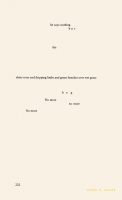
For many, “Infinite Jest” is a kind of sacred work. A magnum opus that can challenge readers simply to finish. The “defining work of the 1990s.” One of the greatest books of all time. Or something to be literally consumed. For poet Jenni B. Baker, David Foster Wallace’s postmodern epic on tennis, recovery and entertainment, is text material for her poetry. Since 2013, Baker has been making poems out of “Infinite Jest” by erasing much of the text, and creating a new piece of writing from what’s left behind.
Since 2013 Jenni B. Baker has been erasing “Infinite Jest,” finding poetry in what she leaves behind.
Poetry In the News
Longtime Editor of Venerable Yale Review Stepping Down
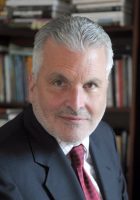
J.D. McClatchy, a prize-winning poet and librettist, told The Associated Press he is leaving The Yale Review, effective at the end of this month. Harold Augenbraum, a visiting Fellow at Yale University and the former executive director of the National Book Foundation, will serve as editor until a permanent replacement is found. "After 27 years as its editor (and for 10 years before that its unpaid poetry editor), it seemed enough," McClatchy, who first informed the school of his decision a year ago, wrote in a recent email to the AP.
J.D. McClatchy, a prize-winning poet and librettist, told The Associated Press he is leaving The Yale Review.
New Books
Some Say: Poems by Maureen N. McLane
[Hardcover] Farrar, Straus and Giroux, 144 pp., $24.95

Maureen N. McLane’s Some Say revolves around a dazzling “old sun.” Here are poems on sex and death; here are poems testing the “bankrupt idea / of nature.” Some Say offers an erotics of attention; a mind roaming, registering, and intermittently blocked; a mortal poet going “nowhere fast but where / we’re all going.” From smartphones to dead gods to the beloved’s body, Some Say charts “the weather of an old day / suckerpunched” into the now.
To the River by Michael O'Brien
[Paperback] Flood Editions, 80 pp., $14.95
"Very few significant American poets called as little attention to themselves in their lifetimes as Michael O'Brien, who died last November at the age of 77. Much as with Lorine Niedecker—whose 'silences', he wrote, 'derive from an intellectual conviction that art, like science, demands total concentration on the object of attention'—his poetry was all about paying attention, in his case to the smallest, most fleeting details in the world at hand. The world in nearly all of O'Brien's city poetry is Manhattan: the Upper West Side during his years at Columbia; Chelsea, where he lived for decades; the financial district, where he had an office job; and Midtown, where he spent the last decade or so of his working life. These city poems are cinematic, in a flickery, stroboscopic manner that uses unlikely juxtapositions to capture something of the speed and density of urban life . . . The shorter nature poetry conveys the sense of words emerging from silence and disappearing back into it. Many of them, particularly those written after 2007, have a spectral quality. Delicacy of observation, oblique precision and subtlety of movement, word by word, syllable by syllable, are the hallmarks of these poems."—August Kleinzahler
Where Now: New and Selected Poems by Laura Kasischke
[Hardcover] Copper Canyon Press, 256 pp., $30.00
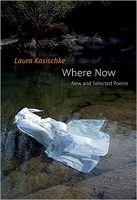
Laura Kasischke’s long-awaited selected poems presents the breadth of her probing vision that subverts the so-called “normal.” A lover of fairy tales, Kasischke showcases her command of the symbolic, with a keen attention to sound in her exploration of the everyday—whether reflections on loss or the complicated realities of childhood and family. As literary critic Stephen Burt wrote in Boston Review, “The future will not see us by one poet alone….If there is any justice in that future, Kasischke is one of the poets it will choose.” This incandescent volume makes the case that Laura Kasischke is one of America’s great poets, and her presence is secure.
To an Unknown Shore by Theodore Enslin
[Paperback] Shearsman Books, 94 pp., $17.00
Theodore Enslin (1925–2011) is widely regarded as one of the most musical of American avant-garde poets. He was born in Chester, Pennsylvania. His father was a biblical scholar and his mother a Latin scholar. He studied musical composition at Cambridge, Mass. His teacher, Nadia Boulanger, was the first person to recognize his ability as a writer and encouraged him to pursue his interest in poetry. He said, "I like to be considered as a composer who happens to use words instead of notes." His first book, The Work Proposed, was published by Origin Press in 1958.
Objects from a Borrowed Confession by Julie Carr
[Paperback] Ahsahta Press, 160 pp., $9.00

With Objects from a Borrowed Confession, poet Julie Carr has undertaken an expansive reexamination, amassing a project written over the last ten years that approaches the subject of confession from within the confession itself. Carr neither mounts an apology on behalf of confessional poets (there is no apology necessary), nor does she offer readers a straightforward critical appraisal of confession in writing itself. Rather, the poet approaches her topic as a theme worthy of consideration, offering fresh insight to what it is about the confessional text that can provide catharsis for one reader just as easily as make another uncomfortable.
Laura Kasischke’s selected poems presents the breadth of her probing vision that subverts the so-called “normal.”
Correspondences
Charles Simic Literally Writes in the Dark
by Peter Mishler
For this fifth installment in a monthly series of interviews with contemporary poets, Peter Mishler talks with Charles Simic. Charles Simic is a poet, essayist, and translator born in Yugoslavia. He has received many literary awards, including the Pulitzer Prize, the Griffin Prize, a MacArthur Fellowship, and the Wallace Stevens Award. Simic is a frequent contributor to the New York Review of Books and in 2007 was chosen as Poet Laureate of the United States. He is Emeritus Professor at the University of New Hampshire, where he has taught since 1973, and is a distinguished visiting writer at New York University.
Michael Longley: ‘Being 77 and three-quarters is the best time of my life’
by Rosita Boland
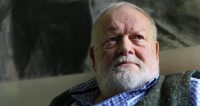
Michael Longley is stretched back in an armchair in his Belfast home, his clothing as colourful as the many bright paintings in the room by his artist daughter, Sarah. Blue gingham shirt. Green waistcoat. Green trousers. Tan slippers. And of course, the distinctive thicket of bogcotton-white beard, that arcs around his chin like an inverted pastoral halo.
What Is Being Charted Here?: Talking with Jennifer S. Cheng
by Emma Winsor Wood
“Geometry,” writes poet and essayist Jennifer S. Cheng in her 2016 poetry collection House A, “is a configuration of parts, each asking itself: How do I adhere?” It is question that reverberates throughout the book’s three sections, a question asked out of the experience of growing up in an immigrant home, immersed in an “alien” language and culture, a home built on displacement and longing. Cheng’s poems, which shift between verse and prose, are at once airy and anchoring, precise and dreamlike, intellectual and intuitive, strange and familiar, maps to nowhere. House A is both ineffable, a ghost house, a kind of template, as well as House A, “A” as in America, our large and complicated home.
Michael Longley is reveling in his status as a near-octogenarian.
Envoi: Editor’s Notes
Found Poetry / Erasure Poetry
I appreciate and often enjoy found poetry, even though it is on the other end of the spectrum from most of the poetry I take pleasure in. But I'm puzzled by the notion of creating art where it already exists (see above), unless it is to subvert or call in to question the premise of the original art, neither of which seems to be the case here. For erasure poetry closer to my taste, I recommend the work of Austin Kleon. Here is a link to his blog: Austin Kleon.
PNIR editor David Sanders finds joy in the erasure poetry of Austin Kleon.